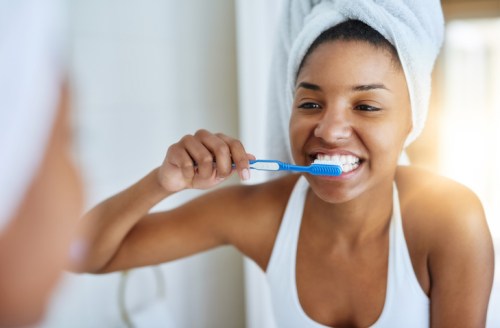Are You Using Too Much Toothpaste? Here’s Exactly Why It Matters
It might be easy to assume that more toothpaste equals more clean when you brush your teeth, but that is actually far from the truth.

It’s essential to brush your teeth, right? (Yes, it is.) The American Dental Association (ADA) says that the ideal routine includes intentional and gentle brushing for two minutes twice a day (plus once-daily flossing). And, given the cavity-fighting power that regular brushing has, it might seem like the more toothpaste you use, the better. Well, that last bit isn’t entirely accurate.
Experts in This Article
Dr. Scott H. Froum is a NYC-based board certified periodontist. He has lectured on the national and international level on implant therapy, bone and gum regeneration, and complications.
Even though you might’ve learned to cover your entire toothbrush with minty paste, it turns out that there is such a thing as too much, so we asked Scott H. Froum, DDS, dentist, and diplomate of the American Board of Periodontology, to break it down for us.
The ideal amount of toothpaste for an adult is a pea-sized bead, and for a child, it’s about the size of a rice grain, says Dr. Froum. You know that you’re squeezing out too much when your toothbrush is full or the glob is threatening to fall off.
There are a few reasons behind this, Dr. Froum says. You need to be able to get into the grooves of your teeth and mouth with a good lather. When you have too much toothpaste swirling around, the excess lather can prevent you from being able to see what you’re brushing and how. There’s only a certain level of benefit toothpaste can offer with each brush, and too much doesn’t automatically mean better. It’s similar to how too much shampoo lather can turn your head into a frothy cupcake—you don’t need to overdo it.
Another reason you want to be intentional about your toothpaste usage, according to the University of California San Francisco, is because fluoride is essential for preventing tooth decay—but that doesn’t mean you should be swallowing a bunch of it. Your teeth need to absorb the fluoride(which is why you’re not actually supposed to rinse your mouth after brushing), but there is such thing as too much fluoride exposure. A 2020 study published in Science Signaling found that too much fluoride exposure can cause visible malformations in tooth enamel and potentially affect your musculoskeletal system at toxic levels (especially for children under 10 years old). Dr. Froum stresses that you’re not actively in danger of this with occasional extra toothpaste, but it’s helpful to know when considering best practices.
To maximize optimal oral health while protecting yourself from too much fluoride, using less toothpaste is the ideal strategy.
Oh hi! You look like someone who loves free workouts, discounts for cutting-edge wellness brands, and exclusive Well+Good content. Sign up for Well+, our online community of wellness insiders, and unlock your rewards instantly.
Sign Up for Our Daily Newsletter
Get all the latest in wellness, trends, food, fitness, beauty, and more delivered right to your inbox.
Got it, you've been added to our email list.










